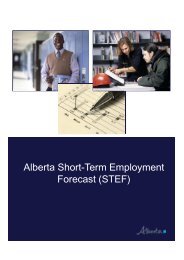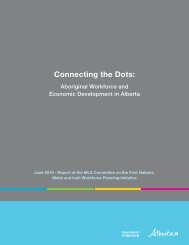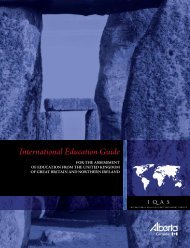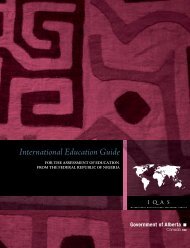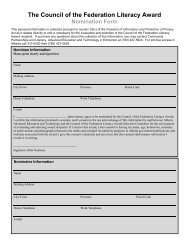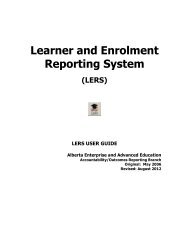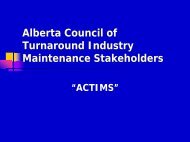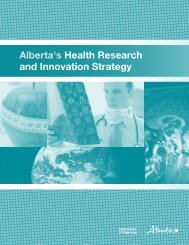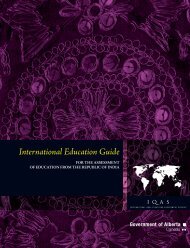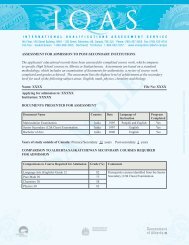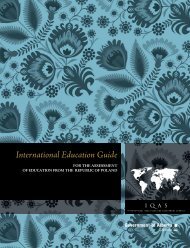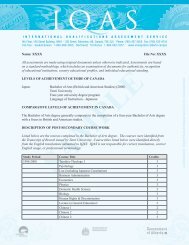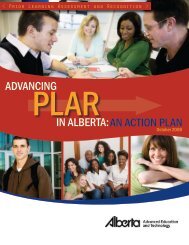International Education Guide - Enterprise and Advanced Education ...
International Education Guide - Enterprise and Advanced Education ...
International Education Guide - Enterprise and Advanced Education ...
Create successful ePaper yourself
Turn your PDF publications into a flip-book with our unique Google optimized e-Paper software.
.46<br />
INTERNATIONAL EDUCATION GUIDE for the assessment of education from the Islamic Republic of Pakistan<br />
Four Employment Categories<br />
as defined by the Commission on National <strong>Education</strong> of 1959<br />
Category<br />
Description<br />
1 Unskilled workers who require manual dexterity for the<br />
performance of their duties<br />
2 Operators in factories <strong>and</strong> offices whose skills in industrial<br />
<strong>and</strong> commercial processes produce goods or services<br />
3 Supervisory personnel with the practical skills to appreciate<br />
the problems of the skilled workers <strong>and</strong> the theoretical<br />
training to underst<strong>and</strong> the ideas of the engineer or<br />
executive <strong>and</strong> to interpret them to the skilled workers<br />
4 Engineers <strong>and</strong> executives capable of developing new<br />
techniques, methods <strong>and</strong> designs<br />
Vocational education generally corresponds to Category<br />
2, <strong>and</strong> trains skilled <strong>and</strong> semi-skilled workers in various<br />
trades. It mainly operates at the secondary level, with<br />
entry based on the completion of middle school (Grade<br />
8), although some vocational courses for girls require only<br />
completion of primary school (Grade 5) for admission.<br />
Technical education generally corresponds to Category<br />
3, <strong>and</strong> trains technicians for mid-level supervisory jobs. It<br />
mainly operates at the higher secondary level <strong>and</strong> above,<br />
with entry based on the completion of secondary school<br />
(Grade 10).<br />
In some contexts, the terms vocational <strong>and</strong> technical<br />
may refer to fields of study. For example, the Secondary<br />
School Certificate (Technical) or Matriculation Certificate<br />
(Technical), awarded by the provincial Boards of Technical<br />
<strong>Education</strong>, is a Grade 10-level certificate that requires Grade<br />
8 for admission. Grade 12 <strong>and</strong> higher level programs may also<br />
be offered in a vocational area or vocational stream.<br />
Administration<br />
Various federal ministries <strong>and</strong> provincial departments are<br />
involved in vocational <strong>and</strong> technical education. A national<br />
skills strategy is being developed to coordinate the work of<br />
government departments <strong>and</strong> to ensure the uniformity of<br />
curriculum <strong>and</strong> st<strong>and</strong>ards.<br />
At the national level, the Ministry of <strong>Education</strong> is<br />
responsible for policy, planning, guidelines, coordination of<br />
st<strong>and</strong>ards <strong>and</strong> curriculum development for vocational <strong>and</strong><br />
technical education. According to the Federal Supervision<br />
of Curricula, Textbooks, Maintenance of St<strong>and</strong>ards of<br />
<strong>Education</strong> Act, 1976, the curriculum wing of the MOE<br />
is in charge of curriculum development for certificate <strong>and</strong><br />
diploma programs offered by vocational <strong>and</strong> technical<br />
institutes, as well as for school education.<br />
The Ministry of Labour <strong>and</strong> Manpower is responsible for<br />
vocational education <strong>and</strong> apprenticeship training in the<br />
various trades.<br />
Several national bodies assist the federal government in<br />
vocational <strong>and</strong> technical education.<br />
• National Vocational <strong>and</strong> Technical <strong>Education</strong><br />
Commission (NAVTEC). Established in 2006<br />
under the Prime Minister’s Office, this commission<br />
is the national apex body for technical <strong>and</strong> vocational<br />
education <strong>and</strong> training. Its m<strong>and</strong>ate is to facilitate,<br />
regulate <strong>and</strong> provide policy direction for technical<br />
education <strong>and</strong> vocational training to meet national <strong>and</strong><br />
international dem<strong>and</strong> for skilled labour.<br />
• National Institute of Science <strong>and</strong> Technical <strong>Education</strong><br />
(NISTE). This institute was established in 1997<br />
with the merger of two national institutes under the<br />
MOE—the National Technical Teachers Training<br />
College <strong>and</strong> the Institute for the Promotion of Science<br />
<strong>Education</strong> <strong>and</strong> Training. It undertakes research <strong>and</strong><br />
develops curriculum <strong>and</strong> learning resources for science<br />
<strong>and</strong> technical education. It also offers various technical<br />
<strong>and</strong> teacher training programs.<br />
• National Training Bureau. This bureau is the<br />
Directorate General of Technical Training under the<br />
Labour <strong>and</strong> Manpower Division of the Ministry of<br />
Labour <strong>and</strong> Manpower. Acting as the secretariat for the<br />
National Training Board, it formulates <strong>and</strong> implements<br />
vocational training policies <strong>and</strong> facilitates training of<br />
skilled workers to meet domestic <strong>and</strong> overseas labour<br />
requirements.<br />
At the provincial level, the education departments <strong>and</strong><br />
departments of labour <strong>and</strong> manpower are responsible for<br />
implementing policy <strong>and</strong> managing vocational <strong>and</strong> technical<br />
institutions <strong>and</strong> programs according to national guidelines.<br />
Provincial Boards of Technical <strong>Education</strong> (in Punjab,<br />
Sindh <strong>and</strong> NWFP) conduct major examinations <strong>and</strong> issue<br />
technical certificates <strong>and</strong> diplomas such as the Secondary<br />
School Certificate (Technical), the Diploma of Associate<br />
Engineer (DAE) <strong>and</strong> the Certificate of Commerce <strong>and</strong><br />
Diploma of Commerce.



